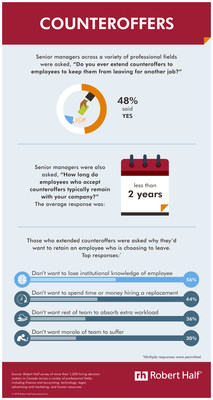Jillian Levick
Senior PR and Communications Manager
Robert Half Canada Inc.,
181 Bay Street, Suite 820,
Toronto, ON
M5J 2T3
www.roberthalf.ca
Press Releases
Read about our latest research, including results from our ongoing surveys of senior managers and workers, and company announcements.

Firms Often Counter With Higher Salaries to Keep Departing Employees, but Staff Leave in Less Than 2 Years Anyway
TORONTO, July 17, 2018 /CNW/ - In the fight to hold onto top talent, many companies are offering higher salaries to workers who announce they're planning to quit for a better job opportunity. But new research from global staffing firm Robert Half suggests this method serves only as a stop-gap retention strategy for employers and isn't a long-term career solution for employees. The findings show staff members who accept counteroffers typically end up leaving the company in less than two years.

Senior managers across a variety of professional fields, including finance and accounting, technology, legal, marketing and advertising, and human resources, were asked, "Do you ever extend counteroffers to employees to keep them from leaving for another job?" Their responses:
|
Yes |
48% |
|
No |
52% |
|
100% |
Senior managers were also asked, "On average, how long do employees who accept counteroffers remain with your company?" The mean response was 1.7 years.
Of the leaders who extend counteroffers, the primary reason they do so, according to the survey, is to prevent the loss of institutional knowledge followed by not wanting to spend time or money hiring a replacement.
"Counteroffers are often a shortsighted retention strategy that typically fail to address the main reasons an employee decided to resign," said Greg Scileppi, president of Robert Half, International Staffing Operations. "Money alone doesn't solve issues like limited opportunity for professional development, or a poor fit with the corporate culture. Before accepting a counteroffer, workers need to carefully evaluate whether a higher salary in the same role will keep them satisfied long-term, or if taking another offer elsewhere will ultimately allow for greater career growth and advancement."
Robert Half offers workers the following advice when considering a career move:
- Create a list of reasons for potentially leaving your current job. Ask yourself if the issues can be resolved with help from your manager or employer before giving notice. If you want to work from home one day per week or seek a raise, ask your boss directly instead of pursuing a competing offer.
- Look within for opportunities. Explore internal career moves or consult your manager to see if there are ways to make your current job more interesting or challenging before you consider quitting.
- Know the potential consequences of accepting a counteroffer. If you decide to stay, your employer may quickly launch a search for a replacement and your colleagues may resent you if they find out you got a raise. In addition, it's likely the counteroffer won't fix the problems that caused you to look for a new job.
About the Research
The online survey was developed by Robert Half and conducted by a leading independent research firm. It includes responses from more than 570 hiring decision makers in Canada across a variety of professional fields.
About Robert Half
Celebrating its 70th anniversary, Robert Half is the world's first and largest specialized staffing firm. The company has more than 300 staffing locations worldwide and offers online job search services on its divisional websites, all of which can be accessed at roberthalf.ca. For career and management advice, follow our blog at roberthalf.ca/blog.
SOURCE Robert Half Canada
